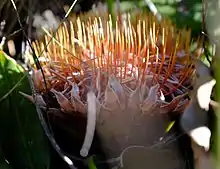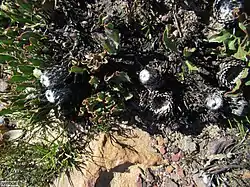| Protea scolopendriifolia | |
|---|---|
 | |
| Scientific classification | |
| Kingdom: | Plantae |
| Clade: | Tracheophytes |
| Clade: | Angiosperms |
| Clade: | Eudicots |
| Order: | Proteales |
| Family: | Proteaceae |
| Genus: | Protea |
| Species: | P. scolopendriifolia |
| Binomial name | |
| Protea scolopendriifolia | |
Protea scolopendriifolia, also known as the harts-tongue-fern sugarbush[2] or hart's-tongue-fern sugarbush,[3] is a flowering shrub endemic to South Africa, where it occurs in both the Western and Eastern Cape.[2] It is found from the Cederberg, through the Kogelberg, Riviersonderend Mountains and Swartberg, to the Kouga Mountains.[2][3] It blooms in Spring, from September to December.[3]
It produces underground rhizomes from which shoots bud off, especially after wildfires. The whole plant that emerges from these rhizomes can be up to 1 metre across. The seed is retained in the seed-head for a considerable time, before being released and scattered by the wind. Each flower has both male and female parts. Pollination occurs through the action of rodents. It grows on Cederberg shale, sometimes on sandstone soils at altitudes varying from 450 m to 1,800 m.[2][3]

References
- ↑ Rebelo, A.G.; Mtshali, H.; von Staden, L. (2020). "Protea scolopendriifolia". IUCN Red List of Threatened Species. 2020: e.T113220783A185563641. doi:10.2305/IUCN.UK.2020-3.RLTS.T113220783A185563641.en.
- 1 2 3 4 Rebelo, A.G.; Mtshali, H.; von Staden, L. (12 June 2019). "Harts-tongue-fern Sugarbush". Red List of South African Plants. version 2020.1. South African National Biodiversity Institute. Retrieved 13 July 2020.
- 1 2 3 4 "Snow Sugarbushes - Proteas". Protea Atlas Project Website. 11 March 1998. Retrieved 13 July 2020.
